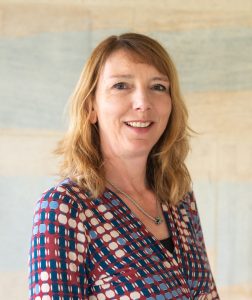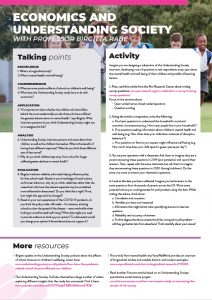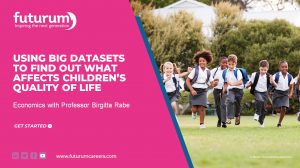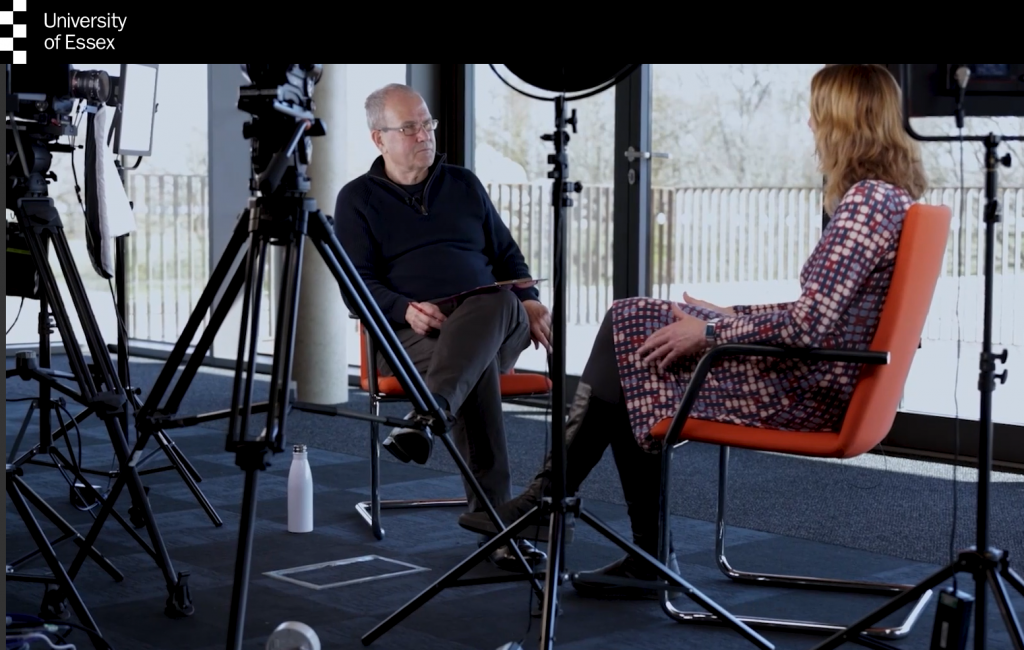Using big datasets to find out what affects children’s quality of life
The Understanding Society study, run by the University of Essex in the UK, has been interviewing residents in around 40,000 UK households annually since 2009 to find out about their lives and how they change over time. This provides a gigantic dataset for uncovering the effects of global events – not least the impacts of the COVID-19 pandemic on the experiences of children. Professor Birgitta Rabe is using this data to inform government support for children’s well-being.
TALK LIKE AN … ECONOMIST
Economics — a branch of social science that studies the production, distribution and consumption of goods and services, as well as a huge variety of other complex issues of vital concern to society
Longitudinal study — a study where the same individuals are repeatedly examined over a long period of time to detect changes that might have occurred
Policy — a particular course of action, usually led by the government
Policymaker — a person responsible for making policies, most usually government policies
Quantifiable — data that are easily expressed and compared as quantities
Understanding Society
Longitudinal studies take place over many years, collecting regular data on the same themes to see how things change over time. “Understanding Society is the largest longitudinal study of its kind and provides crucial information for researchers and policymakers on changes and stability in people’s lives in the UK,” says Professor Birgitta Rabe. A professor of economics and co-investigator on the Understanding Society programme at the University of Essex, Birgitta is especially interested in investigating trends in education, family and labour economics.
Getting large sets of comparable data about arguably ‘fluffy’ topics – people’s feelings or experiences, for instance – is a challenge across the world of science. The Understanding Society programme tackles this through undertaking structured interviews with its participants, asking them the same questions year after year and carefully recording their answers. “Our participants come from every area of the UK,” says Birgitta. “The study captures important information about social and economic circumstances, attitudes, lifestyle, health, family relationships, and employment.”
The importance of schools
In recent years, Birgitta has focused on children and what the data reveals about their educational experiences. “Schools are obviously places for learning, but they are also where children socialise, eat, play, exercise and interact with adults outside their own family,” says Birgitta. Aside from education, there is a lot of robust evidence that schools are crucial for many aspects of childhood development, such as social skills, problem solving and exposure to diversity. “While children may grow up in less or more well-off families, schools can, to some extent, balance out the effects of these experiences by providing all children with the learning inputs and activities they need to thrive,” explains Birgitta.
Understanding Society interviews parents and carers to learn about their children’s experiences of school and to uncover relationships between schooling and aspects of mental health. “Parents answer questions on their children’s emotional and behavioural strengths and difficulties,” says Birgitta. “These questions capture areas such as behavioural problems, emotional symptoms and peer relationships.” Understanding Society also asks children and teenagers directly about their experiences of life, school and relationships. Young people in the survey complete their own questionnaire, which complements the one their carers answer.
Lockdown
The COVID-19 pandemic led to a major disruption in how schools run, as children stayed at home and learning shifted to virtual environments. Understanding Society continued to collect data, albeit via online interviews. “During the pandemic, parents were asked the same questions on their children’s mental health and well-being,” says Birgitta. “Having access to answers to the same questions over time allows us to directly compare changes in children’s mental health.” By gathering the results from all participants in the study, the researchers look for patterns that point to direct or indirect effects of the pandemic on children’s mental health.
“During the summer of 2020, the government advised that some school year groups should return to school after the first lockdown,” says Birgitta. “Our data found that children who were out of school for longer experienced much greater declines in mental health than those able to return to school sooner.” The researchers found that these effects on well-being remained even up to when all children returned to school the following school year. This provides strong evidence of the importance of school for children’s well-being.
Influencing policy
The purpose of Understanding Society is for its results to be used to make the UK a better place to live. This involves communicating the research findings to policymakers who can then make policy decisions informed by these results. “Our results
on children’s mental health helped influence the government’s decision to vaccinate 12 to 15-yearolds against COVID-19,” says Birgitta. “It was originally felt these vaccines wouldn’t be worthwhile as children rarely got very sick from COVID-19, but when the mental health effects of school closures were considered, the balance shifted.” Research from studies such as Understanding Society demonstrated just how detrimental school closures were to children’s mental health, helping policymakers decide that vaccinations for school-age children were a good investment for the mental well-being of students, as they prevented the need for school closures.
A more easily quantifiable effect of the pandemic is the fall in children’s academic performance, which has been a focus for policy, with measures laid out to try and help these children ‘catch up’ with their peers. Birgitta thinks these measures should also incorporate mental health considerations. “As we continue to live with the effects of the pandemic, the government will need to carefully monitor whether policies designed to reduce learning loss will help or hinder attempts to restore children’s mental health and well-being,” she explains. “It’s important to learn whether the children who have fallen behind the most academically are also those who have suffered the greatest deteriorations in mental health.” Based on Understanding Society’s findings, Birgitta believes that specialist mental health support will remain necessary for these children for some time.
Reference
https://doi.org/10.33424/FUTURUM324
Professor Birgitta Rabe in conversation with Professor Jules Pretty, Director of the Centre for Public and Policy Engagement at the University of Essex, for Brighter Futures, a film series about how research can influence policy and change people’s lives.
(All photos courtesy of the University of Essex)
Free school meals
Identifying trends in mental health is just one facet of Understanding Society and Birgitta’s investigations. Birgitta is also interested in the impacts of schools on children’s physical health and what this means for policy. “Schools play an important role in keeping children physically active and in feeding them healthy food,” she says. “Both are enormously important to help children learn, thrive and build healthy habits for a lifetime.” Birgitta’s research uses Understanding Society to study the impact of providing free meals to children in school on the amount of money households spend on food. Especially for poorer families, free school meals can provide a lifeline to help children get the sustenance they need. However, given the costs such an initiative involves for the taxpayer, it remains a contentious issue, so evidence to support it is invaluable.
“We conducted research into the free school meals supplied to all infant school (reception to year 2) children, as well as similar policies brought in at the local level in some areas,” says Birgitta. “Our research has shown that making school meals available to all pupils can help reduce child obesity.” Childhood is where we learn many of the habits, likes and dislikes that last a lifetime, so overcoming childhood obesity is extremely important as it has consequences for children’s long-term health and well-being. Obesity-related health issues also have financial implications for taxpayers and the National Health Service (NHS), so addressing them earlier on could save money in the long run.
These findings have been picked up by influential supporters of free school meals. “Several people, including footballer Marcus Rashford and celebrity chef Jamie Oliver, have used our research to advocate for free school meals throughout the UK,” says Birgitta. The team hopes such exposure will influence long-term policy, helping to boost the health of next generation throughout their lives.
 PROFESSOR BIRGITTA RABE
PROFESSOR BIRGITTA RABE
Institute for Social and Economic Research, University of Essex, UK
Field of research: Economics
Research project: Using longitudinal data to investigate key societal questions around topics such as education, mental well-being and physical health
Funders: Nuffield Foundation, Economical and Social Research Council (ESRC)
Understanding Society is an initiative funded by the Economic and Social Research Council and various Government Departments, with scientific leadership by the Institute for Social and Economic Research, University of Essex, and survey delivery by NatCen Social Research, Kantar and Ipsos MORI. The research data are distributed by the UK Data Service.
ABOUT ECONOMICS
Professor Birgitta Rabe may not seem like the ‘traditional’ economist who you might expect to focus on supply and demand, growth and inflation, and other topics that can seem a bit distant from ‘ordinary’ people’s lives. She explains more about her line of work and why economics is so important for the social sciences and our society at large.
“Many people think that economics is only concerned with large-scale issues such as growth, interest rates and financial markets. In fact, there are scores of economists studying the behaviour of households and individuals. I am fascinated by the factors that influence how children develop, and I hope that my findings can make a difference to children’s lives – even if it is one small step at a time.
As well as those topics explored in this article, I’ve studied the effects of:
- breastfeeding and childcare on early child development.
- school resources on quality of education
- siblings on education and development.
Research in economics will always be needed, both to study the overall economy and the behaviour of people and households within it. We have ever-better data to study important topics that affect all our lives, including through Understanding Society.
Economics is everywhere. I recommend keeping up with the news, from the cost-of-living crisis to how the pound is trading against the dollar, to discrimination in the labour market. So many issues come down to economics, so understanding how these factors influence the world and our society is critical to an understanding of economics itself.”
Pathway from school to economics
• Birgitta says that an A-level in mathematics will likely be important to study economics post-18. A range of other subjects can be useful, including statistics, economics and geography. Find out more about university entry requirements here.
• While an undergraduate degree in economics is likely the most straightforward path to a career in economics, Birgitta notes other pathways are also possible. Find out more about economist careers here.
Explore careers in economics
• The University of Essex, where Birgitta and the Understanding Society programme are based, offers a range of free activities and events for school students of all ages.
• The Royal Economic Society has a number of initiatives for school students, including a programme to increase diversity in economics students, an essay competition for sixth-form (year 12 and 13) students and an open-access annual lecture.
• According to Prospects, typical starting salaries for economists in the UK range from £25,000 to £35,000, with the potential to increase to £40,000 or more after a few years.
How did Birgitta become an economist?
I saw that unequal opportunities in society had a lot to do with economics. This inspired me to learn more and, ultimately, hopefully contribute to changing things for the better.
I like to think my career has been helped by my analytical mind, my drive to see things through to the end and my ability to communicate my findings clearly. Collaborating with great colleagues and working to your own strengths and the strengths of others is also important.
To overcome challenges, sometimes you have to be persistent and just try and try again. Nobody is perfect, and mistakes or setbacks happen to everyone; resilience is what’s important.
A proud career moment for me was winning a prestigious prize for my PhD thesis. I bought a sparkling new bicycle with the prize money! Additionally, seeing my research used for policy is always fantastic.
Learn as much as you can, but stay firmly grounded. It’s important to remain able to speak with non-experts and to never lose sight of the bigger picture of what you’re trying to achieve.
Do you have a question for Birgitta?
Write it in the comments box below and Birgitta will get back to you. (Remember, researchers are very busy people, so you may have to wait a few days.)











